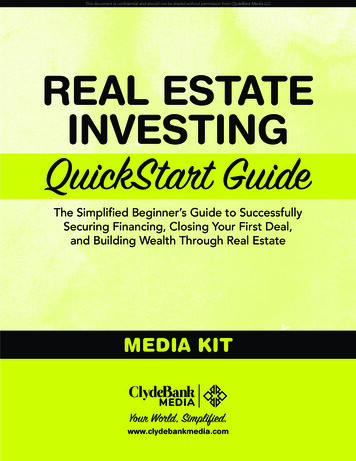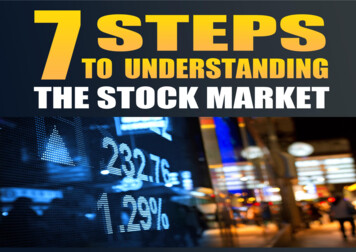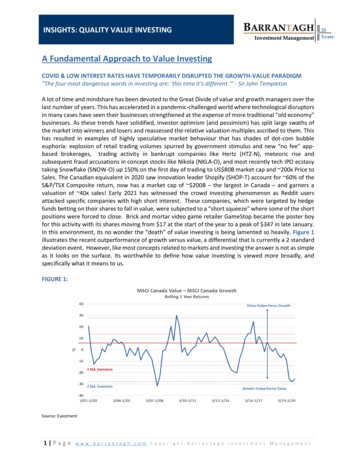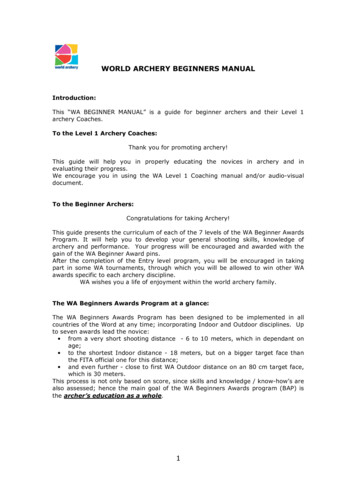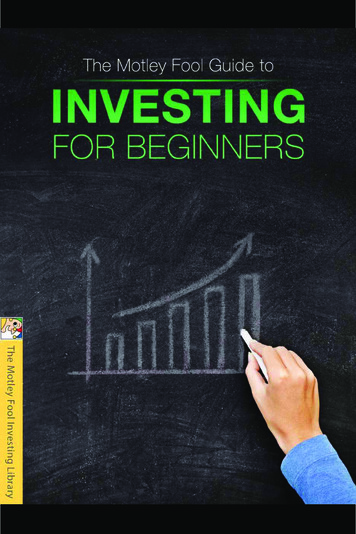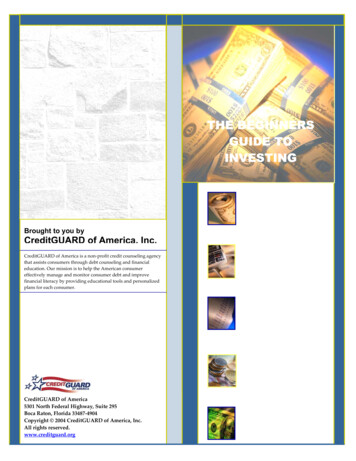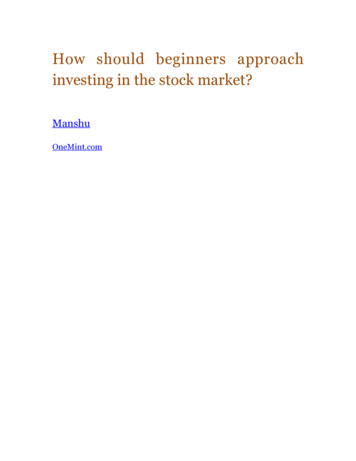
Transcription
How should beginners approachinvesting in the stock market?ManshuOneMint.com
IntroductionThe stock market moves in cycles and every few years when themarket goes up rapidly, there are a number of new investors who getinterested in stocks and want to know what’s the best way to go aboutit.Most newbies start out a certain way, and then over the next few yearsevolve into traders or investors (some just quit the stock market).This short book is for people who are new to the stock market, andare inclined towards developing into long - term investors.It covers how people start out, how you should think of a share in acompany, and based on this knowledge how you can execute astrategy that helps you build wealth using equities.This started out as a series of blog posts, and my hope is that morepeople discover the series through this eBook, and I will continueupdating this as I get suggestions from readers and ideas of my own.Happy reading!2
ds.173
ThreeStagesofanInvestorMost people who have been in the stock market for any duration oftime go through these stages, and I was reminded of this whenKrishna left the following comment (slightly edited) a few days ago:I am a techie and I am preparing myself to start investing in stocks.Google revealed your post & I really admire your work. It will be morehelpful if there is a post describing investing for novices like me.Regards, KKThis is an interesting comment not only because of the nature of thequestion but also because of its timing. I wrote a post titled Why Icontinue to invest in stocks? in December of 2011, and in that post Ilaid out the reasons that made me continue to invest in stocks in thepessimistic environment that existed then.That title sounds fairly ridiculous today, but remember at that timethere was a lot of doom and gloom with respect to the situation inEurope and a lot of people were simply disgusted with the way stockshad dropped.The common concern at the time was whether it made sense tocontinue with SIPs or should you sell all your stocks and invest infixed deposits? Not many people were gearing up to invest in stocksbecause of all the pessimism that surrounded them and there werehardly any new entrants to the market.4
From the time that I wrote the post to the time this commentappeared, the market has risen by some 15% and some smaller stockshave risen a lot more than that.I think it is important to remember the background here because amarket that goes up rapidly draws a lot of first time investors whoreally are speculators at the time. I know that I was attracted to themarket because of this and I know countless other individuals whowere drawn to the market with the hope of a quick buck.At this stage all you’re interested in is speculation and day trading,and you are getting quite a thrill out of it. You have no idea offundamental analysis and you don’t care about any technical analysiseither.I’ve seen people who stay at this stage for years, and you can easilyidentify people in this category by the kind of reasons they give forwhy something will go up or down. The reasons are always rooted insomething that they have personally seen like this share never goesunder Rs. 80 or the share market does well before the budget orsomething similar to that, and this reason will usually sound quitefantastical to anyone else.You should try to get out of this stage as soon as possible losing aslittle money as possible.It’s very hard to convince anyone that they will lose money beforethey lose money so the next best thing I can say is that you should5
speculate with only small amounts of money and then don’t lose heartwhen you lose it because there is a better way to invest in the stockmarket.At the end of the first stage, one of three things will happen:1. You will blame the market for your failure, be disgusted by itand never put any money in it again.2. You will blame yourself for your ignorance and learn moreformal methods of technical trading and trade shares.3. You will blame yourself and learn about long term investingand investing in stocks either directly or through mutual fundsand SIPs.Normally, the people who blame the market for their failure are thepeople who have been at it for a few years, and keep trying the samething over and over again and hope that this time they get differentresults even though it has never worked for them before.If you fall under this category, meaning you’ve traded for a number ofyears but have never read a book on trading then instead of blamingthe market you should blame your process and get into doingsomething more structured – whether it is technical or fundamentalanalysis.6
Far more people fall from the first stage to the second category and Ithink that’s because trading is a lot sexier than long term investingand the kick you get out of trading – you can never get out of buyingand holding.In this category you will find people who are familiar with things likeElliot Waves, Head and Shoulders Patterns, RSI, MACD and othertechnical analysis tools and I think trading like this is better thantrading without any knowledge of technical trading at all but I amskeptical on how effective this is.I’ve not seen any really successful technical traders but then I’m notthe kind of person who knows many traders either. However, I do feelthat it must be very hard to do a full time job and trade on themarkets since you have to be in front of the terminal so often and itcan’t be practical for someone with a regular day job to do that.In any case, this has not worked for me so I’m biased against it and Iwouldn’t recommend anyone with a regular job to get into technicaltrading. If you’re interested in this then there are far too manyinvestment sites and blogs that cater to this and you should followone of them and see if it works for you. If it doesn’t, then, well, trylong term investing after that.In my opinion it is far better to take a longer-term approach toinvesting and get into the third category of investors.7
TheImplicitAssump7onIf you are going to get into the third category of investors you shouldrecognize that as a long – term investor there is an implicitassumption in what you’re doing, and that implicit assumption is thatover the long term the stock market will go up.The stock market is a barometer of the economy, and if the GDP risesthen the stock market indices will also rise with it. About two yearsago, Mr. Mukesh Ambani said that Indian nominal GDP could cross 30 trillion by 2030, and if the economy were to roughly grow at 15%– 16% in the next 20 years – I think the target will be met. Now,remember this is the nominal GDP growth rate (which doesn’t takeinto account inflation) and not the real GDP growth rate and that’swhy it sounds high, but in reality this is close to the nominal growthwe see today.So, if the economy were to grow to 15 times its size in the next 20years, you can expect the stock market to grow along those lines aswell. There won’t be a perfect correlation, but if the economy growsthen the stock market should rise as well.By and large most stock markets have shown this to be possible, butthere are exceptions like Japan whose stock market is just 20% ofwhat it was 30 years ago and then there are long periods of time whenthe Dow didn’t move anywhere at all. Even the Indian markets arelower today than they were 5 years ago.In India’s context, I think the risk is more political than anything else.8
If the political class doesn’t screw up policies and businessenvironment then this growth should be attainable.It’s important to understand that long term investing does rest on thisassumption because if you don’t understand this then you can belulled into thinking that the market will always go up no matter whatso it is safe to have all of your cash in the stock market. There is noguarantee that the market will always go up so it is best to have aportfolio that is diversified between shares and fixed incomeproducts.Whatisthenatureofashare?The next thing that I think is important from the perspective of along-term investor is to understand the nature of a stock or share – toknow what is it that you are buying or selling.What is a share?Long-term investors and traders view a stock or share verydifferently. While traders are more concerned with the price andvolume action of the stock, long-term investors are concerned aboutthe underlying business of the company.They view the share as part ownership in the company and thecorrelation in their mind is between earnings and share price. If thecompany continues to grow profits many years down the line then thestock price will also rise to match that growth.If you think of stocks like this you will start thinking of expensive or9
cheap stocks with relation to the money they make. So, when you lookat a company you will think in terms of how much money thecompany makes (earnings or free cash flow) and how much it isselling for (market capitalization) and base your value decision onthat.A lot of investors will never buy individual stocks and there’s goodreason for that but even then you need to be able to view stocks in thisway to stomach the inevitable volatility that the market exposes youto.This outlooks helps stomach volatility because when the market fallsby 20% or 30% in a short period of time you are able to look at theearnings of the companies whose shares have fallen and say toyourself, surely this company will not go bust and the stock price willnot go to zero.I believe this kind of outlook helps people deal with the volatility thathas been part of the Indian markets for very long and will most likelycontinue to exist in the future as well.Even if you buy mutual funds – it is the same thing since a mutualfund in turn holds shares and it is nothing but a representation of thevalue of shares that the fund holds.This of course is not true if you’ve been buying penny stocks or hotstocks which can go down very fast, and then never recover, but if youhave been steadily buying decent stocks over a long period of time10
then this will hold true.So, to sum it up, long-term investors do rely on the somewhat obvious(even if unspoken) assumption that in the long run, the market willmove upwards and you have to view a share as part ownership in thecompany to be able to truly appreciate what you are buying.Howtoexecutebasedonthisknowledge?Now, I’m going to build on the two concepts I wrote about earlier andshare a few thoughts on execution.I invest regularly in the market throughout the year but I don’t have aSIP set up and I do this on my own. I invest very aggressively in themarket when there is doom and gloom and put in as much as I canlike I was doing in 2012 December, and during the Lehman crisis, andI slow down (but still keep investing) when there isn’t much doomand gloom but people are not over the top as well.There are three big ideas behind this type of thinking – one is that inthe long term I expect markets to edge upwards so even if they aredown today I feel that they will be up 3, 4 or 5 years down the line andas long as no one forces me to sell the position – I can wait for thetide to turn and sell at that time.The second big idea is that markets don’t move in a linear fashion,and no one knows when, why or by how much they will go up or11
down. You can’t simply stop investing with the fear that the marketwill go down more because there is no way to know when the tide willturn and by how much the market will rise then. If you sit on thesidelines when the market is down, then I’m pretty sure you’re sittingon the sidelines through most of the earnings that come about whenthe tide turns.The past decade has shown us that up moves have been as violent asdown – moves and that too at very unexpected times, so that’s why Ilike to stay invested in the market as much as I can. I hear a lot ofpeople say that I’m going to start investing when the market turnsand perhaps Santa whispers when the market is about to turn in theirears, but I am not one of those people.12
The image below illustrates what I’m talking about.Nifty Annual ReturnsThe third big idea is that while you can’t time your in and out, you cantry to calibrate how much you put in the market, and while thatexposes you to additional risk – if you don’t have any loans and canstomach risk and volatility then it is possible to make this volatilitywork in your favor rather than give you jitters.13
The big difficulty in doing this is it’s very hard to buy when everyoneelse is paring down and the general atmosphere is of doom andgloom. However, if you view a stock as ownership in a company and ifyou believe that the company will survive the downturn – that givesyou confidence to hold on and continue buying. Then when the tideturns you will be sitting on some good profits, and you won’t berushed into investing in the market like the people who feel leftbehind by sudden market jumps, and the jumps are always sudden, soat that time you can moderate your investments.I think people who are starting out can leave calibrating out of theequation and start with investing small sums monthly which theycontinue with even when the market is down. I say small sumsbecause it doesn’t hurt as much when you see them in the red (whichyou inevitably will) and it makes it easier to continue investing smallsums even when the market is falling. Within a three to five yearperiod you will get a sense of where you stand as far as shares areconcerned and whether you want to stay away completely from them(understandable) or want to go in very aggressively (alsounderstandable) but whichever way you eventually turn to I’drecommend you follow this approach initially rather than buying andselling daily or weekly in an ad-hoc MutualFundIf you want to invest in equities then ELSS funds are a great way toget started. They are one of the best options in the 80C limit sincethey have the lowest lock in period, and by investing the equity14
portion of your portfolio in ELSS, you ensure that you get some taxbenefit right away which can be pretty significant if you are in the30% bracket and the advent of some great tax free listed bonds alsomeans that even if you don’t invest in bonds with 80C tax benefitsyou can still get good yields so you can keep 80C for equities.I think ELSS funds should be on top of your list if you’re looking toget started with investing in shares.BalancedMutualFundsBalanced funds may appear an odd selection when you first thinkabout them because most of them invest about 35% of their assets indebt products, but past performance has shown that balanced fundshave given returns comparable to good diversified equity funds, andthat stems from the fact that the debt portion of it protects you fromthe sharp downturns that Indian investors have had to face manytimes during the last two decades, and there’s hardly any reason whythat would stop from happening in the future.GoodDiversifiedFundsHemant has a great article on some of the best diversified funds withsome great comments that can be used to select a couple of diversifiedmutual funds to add to the balanced funds in the list above.NiIyIndexFundsInternationally, index funds have done a lot better than active funds, Ibelieve this is not true for India, and I’ve highlighted the reasons inthis post (also read instructive disagreeing comments from Nitin).15
Having said that, I feel if you are going to construct an equityportfolio, at least a small part of that should be a low cost index fundbased on a large cap index like the Nifty or Sensex. I say that becausecosts eat into returns and index funds are lower cost (though not aslow as American funds) when compared with active funds, and havealso performed decently in the past and give you the peace of mindthat the fund manager won’t be screwing around with your money.The reason to stick to the big indices is that the Indian market is notvery deep and volatility becomes quite high when you start movingtowards the smaller caps.These are some options from which you can consider choosing from,and as to the question of how much money you should invest – Ithink a little less than you are comfortable with is a good way to start.I say that because it is hard for people to come to terms with howviolently and quickly the market can fall, and how difficult it is to notpanic and sell when you own funds that have gone down 15% or 20%in a month or two. Getting into the market with lower amounts willensure that you’re able to deal with this volatility and get a grasp onhow you feel about the market and feel more confident going in withbigger sums later on.If you’re starting off then it is likely that you are in your twenties andstill have a good 30 – 40 years of investing ahead of you, don’t rush toput all in and then later find out that you weren’t ready to risk thatmuch money. More than losing the money, it will turn you away fromthe market completely and that means you lose out on what is16
potentially a great opportunity to steadily grow your money in yearsto come.Par7ngWordsIf you have been attracted to the stock market with the promises ofquick riches, then you should quickly temper down your expectationsbecause that’s the number one reason people lose money. The stockmarket is a place where it is possible to make enough money to beatinflation, and then some but not if you treat it like a casino. There isstructure to investing, and the sooner you learn about them the fewermistakes you will make, and that’s important because every mistakecosts you real money in the stock market.Happy investing!17
over the long term the stock market will go up. The stock market is a barometer of the economy, and if the GDP rises then the stock market indices will also rise with it. About two years ago, Mr. Mukesh Ambani said that Indian nominal GDP could cross 30 trillion by 2030, and if the economy were to roughly grow at 15%
